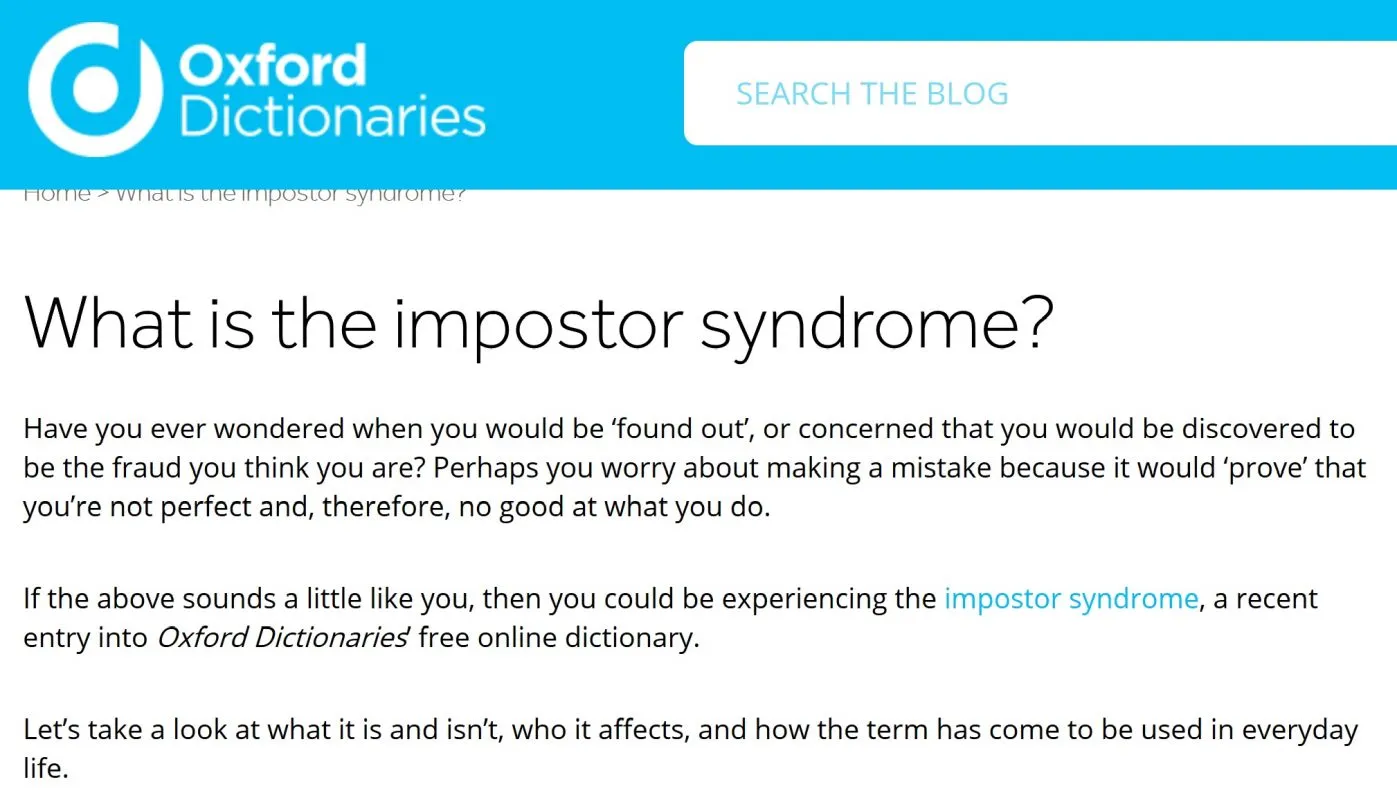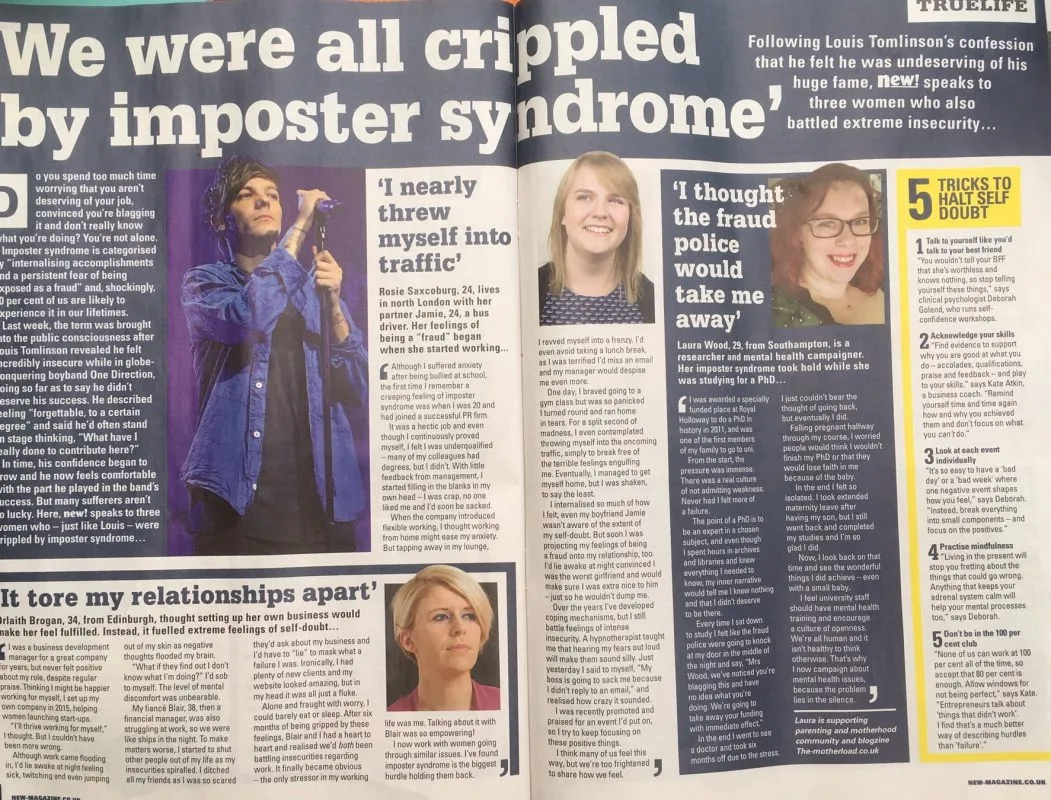The Imposter Phenomenon
April 2017 saw “impostor syndrome” enter the Oxford English Dictionary. The Imposter Phenomenon (now commonly referred to as imposter syndrome) was first identified in 1978 by Pauline Rose Clance and Suzanne Imes. Initially thought to affect women (we now know men suffer from imposter feelings too), it is an internal thought process which goes something like… “When will they find me out?”, “Did they really mean to promote me?”, “If I make a mistake it will prove I’ve been faking it all along”. Thankfully these feelings can be overcome, with time and a little effort… see below.
Boosting confidence and banishing the imposter
In addition, but often confused with imposter feelings is self-efficacy (self-confidence to you and me). Self-efficacy, “the perceived ability to succeed at a given task”, is something which ebbs and flows depending on the task in hand or the mood you’re in. Albert Bandura, emeritus professor at Stanford University, has researched ways in which self-efficacy can be enhanced. In my workshops I explore these to help you to benefit from Bandura’s insights.
A short diversion into my own story…
Between 2013 and 2015 I undertook a course of study which I never in my wildest dreams, thought I would do, and I am continuing with my studies, now at PhD level.
Growing up in rural Lincolnshire, I was the middle one of three girls (though I’m on the right in the photo). Before I left primary school and moved up to the next school I took the 11-Plus – a test which, at that time in the UK, determined whether you were clever enough to go to an elite Grammar School. If you failed you went to the Secondary Modern school. I failed. Both my older and younger sister passed and went to the local Grammar School. Therefore, I was not clever, not academic, not bright… Or at least that was my thinking.

But I’m not academic!
Fast forward to 2007 when I met my husband Stuart, a Cambridge University graduate, who has more degrees than I care to count to his name (four, I think). So when he suggested that I could study for a Masters degree in applied positive psychology, I was taken aback. After going through “I can’t” “the university won’t want me” “I only have an HND”, I found the courage to apply, was accepted and embarked on two years of part-time study.
In November 2015 I was awarded my MSc in Applied Positive Psychology, with distinction. Whoohoo! But that’s not the whole story – during my studies I came across a psychological concept that resonated so strongly with me – the imposter phenomenon.
Have you ever wondered when you would be ‘found out’ or felt terrified at making a mistake because it ‘proves’ you are not perfect, and therefore not up to the job? First defined by two American academics, Pauline Clance and Suzanne Imes (1978), this phenomenon, often incorrectly referred to as a syndrome, is not confined to women, nor to academics, nor to those who work for others. I realised that I had been experiencing the imposter phenomenon for much of my life. So I set to reading and researching all I could about the phenomenon, finding out what I could do for myself, and also how I could help others who experience these feelings.
So what is the Imposter Phenomenon / Imposter Syndrome?
First, let’s explore what it is not. The imposter phenomenon does not refer to people who really are imposters, for instance those charlatans or fraudsters who we might have the misfortune to meet from time to time. Nor does it refer to those people who ‘fake it until they make it’ which some self-help books like to suggest as a route to fame and fortune. Nor does it refer to those moments self-doubt that we all experience from time to time.
No, the imposter phenomenon is defined as an intense, internal feeling of phoniness; a feeling that we are not really as good as everyone else thinks we are; that we are an imposter who will be found out one day. But it is a feeling – it is not actual phoniness. We truly are competent, knowledgeable or skilled, but inside we just don’t believe it.
So if it is just a feeling, where’s the problem? The issue arises because many of those who experience this feeling are successful, highly capable, intelligent people (men and women), but feeling like an imposter holds them back from going for that next promotion, speaking up in a meeting, or saying what needs to be said to the Board. In essence, the belief that they are not really as good as everyone else thinks they are prevents them from reaching their full potential.
Surely with the levels of self-confidence needed to reach senior positions, or set out as an entrepreneur, those people can’t possibly experience negative feelings like this? Well, recent research, conducted by yours truly, with twelve successful entrepreneurs shows that a surprising number of them do. Like others experiencing the imposter phenomenon, entrepreneurs find themselves going through phases of feeling as if they will be found out. However, they are usually very good at hiding this feeling from the rest of us. One of my interviewees described it pointedly as “avoiding the ghosts of reality” while others, both male and female, said that they adopted different personas for different situations to avoid being ‘found out’.
How do you know if you are experiencing the imposter phenomenon?
You can download and read the attached statements, which will give you a guide as to how strong your imposter feelings are. They are not scientifically validated, nor constitute any form of diagnosis, but will provide you with an indication.
What can be done if you are experiencing this phenomenon?
First and most importantly, acknowledge it to yourself, and to someone else. It helps to talk about it. In my role as a keynote speaker and coach, I have seen dramatic changes in people who have had the opportunity to share their imposter feelings, realising that they are not alone, and come to terms with them (research by Lane (2015) observed that participants reported talking about the phenomenon helped them understand it and as a consequence they could handle their imposter feelings more effectively).
Secondly, accept that no-one, not even you, will be perfect, no matter how hard you try (this is something I am still working on – as my husband, a fully signed up member of the ‘just good enough’ school, keeps pointing out).
Thirdly, acknowledge the role your skills and abilities have played in your success. Don’t put it all down to luck, timing or hard work. While these will no doubt have played a role, without your skills and abilities no amount of luck, timing or hard work would have enabled you to achieve what you have achieved.
I offer workshops and keynote talks on the impact of the Imposter Phenomenon, such as “Success: what lies behind the mask?”
You can also download my Tips Booklet The Confidence Factor which you may find useful.
Do get in touch if you would like to discuss a talk, keynote, workshop or coaching. I can be contacted on 07779 646 976, email kate@kateatkin.com
Finally, this TED-Ed video by Elizabeth Cox, entitled ‘What is imposter syndrome and how can you combat it?’, is well worth a watch:
References
Atkin, K. (2015) Entrepreneurship and the imposter phenomenon: A qualitative analysis of the role of self-efficacy MSc thesis unpublished
Clance, P. R., & Imes, S. A. (1978). The imposter phenomenon in high achieving women: Dynamics and therapeutic intervention. Psychotherapy: Theory, Research & Practice, 15(3), 241 – 247.


